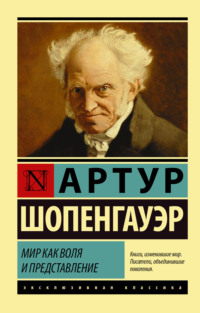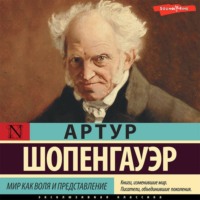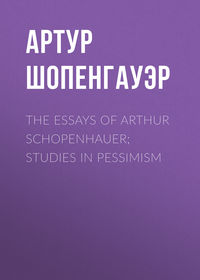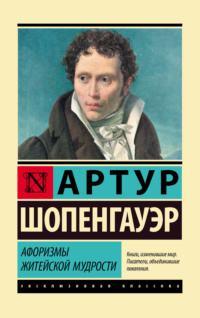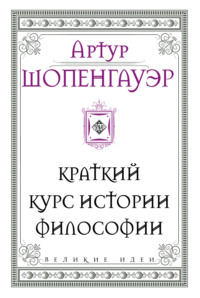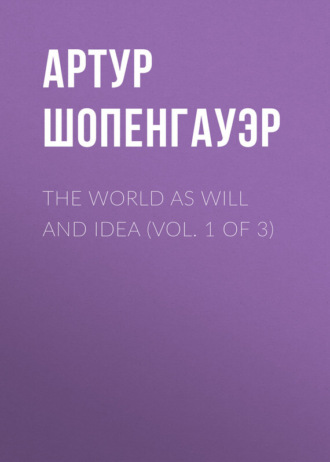 полная версия
полная версияThe World as Will and Idea (Vol. 1 of 3)
§ 7. With reference to our exposition up to this point, it must be observed that we did not start either from the object or the subject, but from the idea, which contains and presupposes them both; for the antithesis of object and subject is its primary, universal and essential form. We have therefore first considered this form as such; then (though in this respect reference has for the most part been made to the introductory essay) the subordinate forms of time, space and causality. The latter belong exclusively to the object, and yet, as they are essential to the object as such, and as the object again is essential to the subject as such, they may be discovered from the subject, i. e., they may be known a priori, and so far they are to be regarded as the common limits of both. But all these forms may be referred to one general expression, the principle of sufficient reason, as we have explained in the introductory essay.
This procedure distinguishes our philosophical method from that of all former systems. For they all start either from the object or from the subject, and therefore seek to explain the one from the other, and this according to the principle of sufficient reason. We, on the contrary, deny the validity of this principle with reference to the relation of subject and object, and confine it to the object. It may be thought that the philosophy of identity, which has appeared and become generally known in our own day, does not come under either of the alternatives we have named, for it does not start either from the subject or from the object, but from the absolute, known through “intellectual intuition,” which is neither object nor subject, but the identity of the two. I will not venture to speak of this revered identity, and this absolute, for I find myself entirely devoid of all “intellectual intuition.” But as I take my stand merely on those manifestoes of the “intellectual intuiter” which are open to all, even to profane persons like myself, I must yet observe that this philosophy is not to be excepted from the alternative errors mentioned above. For it does not escape these two opposite errors in spite of its identity of subject and object, which is not thinkable, but only “intellectually intuitable,” or to be experienced by a losing of oneself in it. On the contrary, it combines them both in itself; for it is divided into two parts, firstly, transcendental idealism, which is just Fichte's doctrine of the ego, and therefore teaches that the object is produced by the subject, or evolved out of it in accordance with the principle of sufficient reason; secondly, the philosophy of nature, which teaches that the subject is produced little by little from the object, by means of a method called construction, about which I understand very little, yet enough to know that it is a process according to various forms of the principle of sufficient reason. The deep wisdom itself which that construction contains, I renounce; for as I entirely lack “intellectual intuition,” all those expositions which presuppose it must for me remain as a book sealed with seven seals. This is so truly the case that, strange to say, I have always been unable to find anything at all in this doctrine of profound wisdom but atrocious and wearisome bombast.
The systems starting from the object had always the whole world of perception and its constitution as their problem; yet the object which they take as their starting-point is not always this whole world of perception, nor its fundamental element, matter. On the contrary, a division of these systems may be made, based on the four classes of possible objects set forth in the introductory essay. Thus Thales and the Ionic school, Democritus, Epicurus, Giordano Bruno, and the French materialists, may be said to have started from the first class of objects, the real world: Spinoza (on account of his conception of substance, which is purely abstract, and exists only in his definition) and, earlier, the Eleatics, from the second class, the abstract conception: the Pythagoreans and Chinese philosophy in Y-King, from the third class, time, and consequently number: and, lastly, the schoolmen, who teach a creation out of nothing by the act of will of an extra-mundane personal being, started from the fourth class of objects, the act of will directed by knowledge.
Of all systems of philosophy which start from the object, the most consistent, and that which may be carried furthest, is simple materialism. It regards matter, and with it time and space, as existing absolutely, and ignores the relation to the subject in which alone all this really exists. It then lays hold of the law of causality as a guiding principle or clue, regarding it as a self-existent order (or arrangement) of things, veritas aeterna, and so fails to take account of the understanding, in which and for which alone causality is. It seeks the primary and most simple state of matter, and then tries to develop all the others from it; ascending from mere mechanism, to chemism, to polarity, to the vegetable and to the animal kingdom. And if we suppose this to have been done, the last link in the chain would be animal sensibility – that is knowledge – which would consequently now appear as a mere modification or state of matter produced by causality. Now if we had followed materialism thus far with clear ideas, when we reached its highest point we would suddenly be seized with a fit of the inextinguishable laughter of the Olympians. As if waking from a dream, we would all at once become aware that its final result – knowledge, which it reached so laboriously, was presupposed as the indispensable condition of its very starting-point, mere matter; and when we imagined that we thought matter, we really thought only the subject that perceives matter; the eye that sees it, the hand that feels it, the understanding that knows it. Thus the tremendous petitio principii reveals itself unexpectedly; for suddenly the last link is seen to be the starting-point, the chain a circle, and the materialist is like Baron Münchausen who, when swimming in water on horseback, drew the horse into the air with his legs, and himself also by his cue. The fundamental absurdity of materialism is that it starts from the objective, and takes as the ultimate ground of explanation something objective, whether it be matter in the abstract, simply as it is thought, or after it has taken form, is empirically given – that is to say, is substance, the chemical element with its primary relations. Some such thing it takes, as existing absolutely and in itself, in order that it may evolve organic nature and finally the knowing subject from it, and explain them adequately by means of it; whereas in truth all that is objective is already determined as such in manifold ways by the knowing subject through its forms of knowing, and presupposes them; and consequently it entirely disappears if we think the subject away. Thus materialism is the attempt to explain what is immediately given us by what is given us indirectly. All that is objective, extended, active – that is to say, all that is material – is regarded by materialism as affording so solid a basis for its explanation, that a reduction of everything to this can leave nothing to be desired (especially if in ultimate analysis this reduction should resolve itself into action and reaction). But we have shown that all this is given indirectly and in the highest degree determined, and is therefore merely a relatively present object, for it has passed through the machinery and manufactory of the brain, and has thus come under the forms of space, time and causality, by means of which it is first presented to us as extended in space and ever active in time. From such an indirectly given object, materialism seeks to explain what is immediately given, the idea (in which alone the object that materialism starts with exists), and finally even the will from which all those fundamental forces, that manifest themselves, under the guidance of causes, and therefore according to law, are in truth to be explained. To the assertion that thought is a modification of matter we may always, with equal right, oppose the contrary assertion that all matter is merely the modification of the knowing subject, as its idea. Yet the aim and ideal of all natural science is at bottom a consistent materialism. The recognition here of the obvious impossibility of such a system establishes another truth which will appear in the course of our exposition, the truth that all science properly so called, by which I understand systematic knowledge under the guidance of the principle of sufficient reason, can never reach its final goal, nor give a complete and adequate explanation: for it is not concerned with the inmost nature of the world, it cannot get beyond the idea; indeed, it really teaches nothing more than the relation of one idea to another.
Every science must start from two principal data. One of these is always the principle of sufficient reason in some form or another, as organon; the other is its special object as problem. Thus, for example, geometry has space as problem, and the ground of existence in space as organon. Arithmetic has time as problem, and the ground of existence in time as organon. Logic has the combination of concepts as such as problem, and the ground of knowledge as organon. History has the past acts of men treated as a whole as problem, and the law of human motives as organon. Natural science has matter as problem, and the law of causality as organon. Its end and aim is therefore, by the guidance of causality, to refer all possible states of matter to other states, and ultimately to one single state; and again to deduce these states from each other, and ultimately from one single state. Thus two states of matter stand over against each other in natural science as extremes: that state in which matter is furthest from being the immediate object of the subject, and that state in which it is most completely such an immediate object, i. e., the most dead and crude matter, the primary element, as the one extreme, and the human organism as the other. Natural science as chemistry seeks for the first, as physiology for the second. But as yet neither extreme has been reached, and it is only in the intermediate ground that something has been won. The prospect is indeed somewhat hopeless. The chemists, under the presupposition that the qualitative division of matter is not, like quantitative division, an endless process, are always trying to decrease the number of the elements, of which there are still about sixty; and if they were to succeed in reducing them to two, they would still try to find the common root of these. For, on the one hand, the law of homogeneity leads to the assumption of a primary chemical state of matter, which alone belongs to matter as such, and precedes all others which are not essentially matter as such, but merely contingent forms and qualities. On the other hand, we cannot understand how this one state could ever experience a chemical change, if there did not exist a second state to affect it. Thus the same difficulty appears in chemistry which Epicurus met with in mechanics. For he had to show how the first atom departed from the original direction of its motion. Indeed this contradiction, which develops entirely of itself and can neither be escaped nor solved, might quite properly be set up as a chemical antinomy. Thus an antinomy appears in the one extreme of natural science, and a corresponding one will appear in the other. There is just as little hope of reaching this opposite extreme of natural science, for we see ever more clearly that what is chemical can never be referred to what is mechanical, nor what is organic to what is chemical or electrical. Those who in our own day are entering anew on this old, misleading path, will soon slink back silent and ashamed, as all their predecessors have done before them. We shall consider this more fully in the second book. Natural science encounters the difficulties which we have cursorily mentioned, in its own province. Regarded as philosophy, it would further be materialism; but this, as we have seen, even at its birth, has death in its heart, because it ignores the subject and the forms of knowledge, which are presupposed, just as much in the case of the crudest matter, from which it desires to start, as in that of the organism, at which it desires to arrive. For, “no object without a subject,” is the principle which renders all materialism for ever impossible. Suns and planets without an eye that sees them, and an understanding that knows them, may indeed be spoken of in words, but for the idea, these words are absolutely meaningless. On the other hand, the law of causality and the treatment and investigation of nature which is based upon it, lead us necessarily to the conclusion that, in time, each more highly organised state of matter has succeeded a cruder state: so that the lower animals existed before men, fishes before land animals, plants before fishes, and the unorganised before all that is organised; that, consequently, the original mass had to pass through a long series of changes before the first eye could be opened. And yet, the existence of this whole world remains ever dependent upon the first eye that opened, even if it were that of an insect. For such an eye is a necessary condition of the possibility of knowledge, and the whole world exists only in and for knowledge, and without it is not even thinkable. The world is entirely idea, and as such demands the knowing subject as the supporter of its existence. This long course of time itself, filled with innumerable changes, through which matter rose from form to form till at last the first percipient creature appeared, – this whole time itself is only thinkable in the identity of a consciousness whose succession of ideas, whose form of knowing it is, and apart from which, it loses all meaning and is nothing at all. Thus we see, on the one hand, the existence of the whole world necessarily dependent upon the first conscious being, however undeveloped it may be; on the other hand, this conscious being just as necessarily entirely dependent upon a long chain of causes and effects which have preceded it, and in which it itself appears as a small link. These two contradictory points of view, to each of which we are led with the same necessity, we might again call an antinomy in our faculty of knowledge, and set it up as the counterpart of that which we found in the first extreme of natural science. The fourfold antinomy of Kant will be shown, in the criticism of his philosophy appended to this volume, to be a groundless delusion. But the necessary contradiction which at last presents itself to us here, finds its solution in the fact that, to use Kant's phraseology, time, space, and causality do not belong to the thing-in-itself, but only to its phenomena, of which they are the form; which in my language means this: The objective world, the world as idea, is not the only side of the world, but merely its outward side; and it has an entirely different side – the side of its inmost nature – its kernel – the thing-in-itself. This we shall consider in the second book, calling it after the most immediate of its objective manifestations – will. But the world as idea, with which alone we are here concerned, only appears with the opening of the first eye. Without this medium of knowledge it cannot be, and therefore it was not before it. But without that eye, that is to say, outside of knowledge, there was also no before, no time. Thus time has no beginning, but all beginning is in time. Since, however, it is the most universal form of the knowable, in which all phenomena are united together through causality, time, with its infinity of past and future, is present in the beginning of knowledge. The phenomenon which fills the first present must at once be known as causally bound up with and dependent upon a sequence of phenomena which stretches infinitely into the past, and this past itself is just as truly conditioned by this first present, as conversely the present is by the past. Accordingly the past out of which the first present arises, is, like it, dependent upon the knowing subject, without which it is nothing. It necessarily happens, however, that this first present does not manifest itself as the first, that is, as having no past for its parent, but as being the beginning of time. It manifests itself rather as the consequence of the past, according to the principle of existence in time. In the same way, the phenomena which fill this first present appear as the effects of earlier phenomena which filled the past, in accordance with the law of causality. Those who like mythological interpretations may take the birth of Kronos (χρονος), the youngest of the Titans, as a symbol of the moment here referred to at which time appears, though, indeed it has no beginning; for with him, since he ate his father, the crude productions of heaven and earth cease, and the races of gods and men appear upon the scene.
This explanation at which we have arrived by following the most consistent of the philosophical systems which start from the object, materialism, has brought out clearly the inseparable and reciprocal dependence of subject and object, and at the same time the inevitable antithesis between them. And this knowledge leads us to seek for the inner nature of the world, the thing-in-itself, not in either of the two elements of the idea, but in something quite distinct from it, and which is not encumbered with such a fundamental and insoluble antithesis.
Opposed to the system we have explained, which starts from the object in order to derive the subject from it, is the system which starts from the subject and tries to derive the object from it. The first of these has been of frequent and common occurrence throughout the history of philosophy, but of the second we find only one example, and that a very recent one; the “philosophy of appearance” of J. G. Fichte. In this respect, therefore, it must be considered; little real worth or inner meaning as the doctrine itself had. It was indeed for the most part merely a delusion, but it was delivered with an air of the deepest earnestness, with sustained loftiness of tone and zealous ardour, and was defended with eloquent polemic against weak opponents, so that it was able to present a brilliant exterior and seemed to be something. But the genuine earnestness which keeps truth always steadfastly before it as its goal, and is unaffected by any external influences, was entirely wanting to Fichte, as it is to all philosophers who, like him, concern themselves with questions of the day. In his case, indeed, it could not have been otherwise. A man becomes a philosopher by reason of a certain perplexity, from which he seeks to free himself. This is Plato's θαυμαξειν, which he calls a μαλα φιλοσοφικον παθος. But what distinguishes the false philosopher from the true is this: the perplexity of the latter arises from the contemplation of the world itself, while that of the former results from some book, some system of philosophy which is before him. Now Fichte belongs to the class of the false philosophers. He was made a philosopher by Kant's doctrine of the thing-in-itself, and if it had not been for this he would probably have pursued entirely different ends, with far better results, for he certainly possessed remarkable rhetorical talent. If he had only penetrated somewhat deeply into the meaning of the book that made him a philosopher, “The Critique of Pure Reason,” he would have understood that its principal teaching about mind is this. The principle of sufficient reason is not, as all scholastic philosophy maintains, a veritas aeterna– that is to say, it does not possess an unconditioned validity before, outside of, and above the world. It is relative and conditioned, and valid only in the sphere of phenomena, and thus it may appear as the necessary nexus of space and time, or as the law of causality, or as the law of the ground of knowledge. The inner nature of the world, the thing-in-itself can never be found by the guidance of this principle, for all that it leads to will be found to be dependent and relative and merely phenomenal, not the thing-in-itself. Further, it does not concern the subject, but is only the form of objects, which are therefore not things-in-themselves. The subject must exist along with the object, and the object along with the subject, so that it is impossible that subject and object can stand to each other in a relation of reason and consequent. But Fichte did not take up the smallest fragment of all this. All that interested him about the matter was that the system started from the subject. Now Kant had chosen this procedure in order to show the fallacy of the prevalent systems, which started from the object, and through which the object had come, to be regarded as a thing-in-itself. Fichte, however, took this departure from the subject for the really important matter, and like all imitators, he imagined that in going further than Kant he was surpassing him. Thus he repeated the fallacy with regard to the subject, which all the previous dogmatism had perpetrated with regard to the object, and which had been the occasion of Kant's “Critique”. Fichte then made no material change, and the fundamental fallacy, the assumption of a relation of reason and consequent between object and subject, remained after him as it was before him. The principle of sufficient reason possessed as before an unconditioned validity, and the only difference was that the thing-in-itself was now placed in the subject instead of, as formerly, in the object. The entire relativity of both subject and object, which proves that the thing-in-itself, or the inner nature of the world, is not to be sought in them at all, but outside of them, and outside everything else that exists merely relatively, still remained unknown. Just as if Kant had never existed, the principle of sufficient reason is to Fichte precisely what it was to all the schoolmen, a veritas aeterna. As an eternal fate reigned over the gods of old, so these aeternæ veritates, these metaphysical, mathematical and metalogical truths, and in the case of some, the validity of the moral law also, reigned over the God of the schoolmen. These veritates alone were independent of everything, and through their necessity both God and the world existed. According to the principle of sufficient reason, as such a veritas aeterna, the ego is for Fichte the ground of the world, or of the non-ego, the object, which is just its consequent, its creation. He has therefore taken good care to avoid examining further or limiting the principle of sufficient reason. If, however, it is thought I should specify the form of the principle of sufficient reason under the guidance of which Fichte derives the non-ego from the ego, as a spider spins its web out of itself, I find that it is the principle of sufficient reason of existence in space: for it is only as referred to this that some kind of meaning and sense can be attached to the laboured deductions of the way in which the ego produces and fabricates the non-ego from itself, which form the content of the most senseless, and consequently the most wearisome book that was ever written. This philosophy of Fichte, otherwise not worth mentioning, is interesting to us only as the tardy expression of the converse of the old materialism. For materialism was the most consistent system starting from the object, as this is the most consistent system starting from the subject. Materialism overlooked the fact that, with the simplest object, it assumed the subject also; and Fichte overlooked the fact that with the subject (whatever he may call it) he assumed the object also, for no subject is thinkable without an object. Besides this he forgot that all a priori deduction, indeed all demonstration in general, must rest upon some necessity, and that all necessity is based on the principle of sufficient reason, because to be necessary, and to follow from given grounds are convertible conceptions.10 But the principle of sufficient reason is just the universal form of the object as such. Thus it is in the object, but is not valid before and outside of it; it first produces the object and makes it appear in conformity with its regulative principle. We see then that the system which starts from the subject contains the same fallacy as the system, explained above, which starts from the object; it begins by assuming what it proposes to deduce, the necessary correlative of its starting-point.




